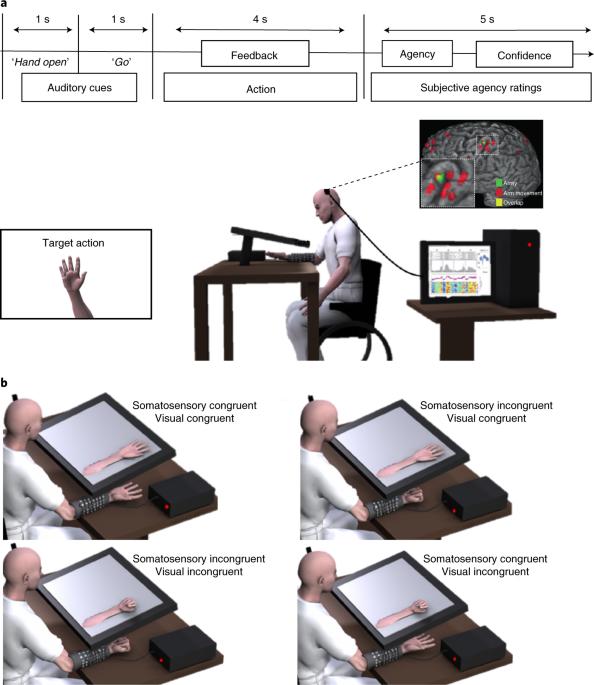Sense of agency for intracortical brain–machine interfaces
IF 21.4
1区 心理学
Q1 MULTIDISCIPLINARY SCIENCES
引用次数: 10
Abstract
Intracortical brain–machine interfaces decode motor commands from neural signals and translate them into actions, enabling movement for paralysed individuals. The subjective sense of agency associated with actions generated via intracortical brain–machine interfaces, the neural mechanisms involved and its clinical relevance are currently unknown. By experimentally manipulating the coherence between decoded motor commands and sensory feedback in a tetraplegic individual using a brain–machine interface, we provide evidence that primary motor cortex processes sensory feedback, sensorimotor conflicts and subjective states of actions generated via the brain–machine interface. Neural signals processing the sense of agency affected the proficiency of the brain–machine interface, underlining the clinical potential of the present approach. These findings show that primary motor cortex encodes information related to action and sensing, but also sensorimotor and subjective agency signals, which in turn are relevant for clinical applications of brain–machine interfaces. Serino et al. studied the sense of agency for actions generated via a brain–machine interface. They show that primary motor cortex encodes not only motor and sensory signals, but also subjective agency signals, enabling improved brain–machine interface proficiency.

皮层内脑机接口的代入感
皮层内脑机界面从神经信号中解码运动指令,并将其转化为动作,从而使瘫痪者能够运动。通过皮层内脑机界面产生的与动作相关的主观代入感、所涉及的神经机制及其临床意义目前尚不清楚。通过使用脑机接口实验操纵四肢瘫痪者的解码运动指令与感觉反馈之间的一致性,我们提供了初级运动皮层处理感觉反馈、感觉运动冲突和通过脑机接口产生的动作的主观状态的证据。处理代入感的神经信号影响了脑机接口的熟练程度,这凸显了本方法的临床潜力。这些研究结果表明,初级运动皮层不仅编码与动作和感觉有关的信息,还编码感觉运动和主观代理信号,而这些信号反过来又与脑机接口的临床应用相关。Serino 等人研究了通过脑机接口产生的动作的代理感。他们的研究表明,初级运动皮层不仅能编码运动和感觉信号,还能编码主观代理信号,从而提高脑机接口的熟练程度。
本文章由计算机程序翻译,如有差异,请以英文原文为准。
求助全文
约1分钟内获得全文
求助全文
来源期刊

Nature Human Behaviour
Psychology-Social Psychology
CiteScore
36.80
自引率
1.00%
发文量
227
期刊介绍:
Nature Human Behaviour is a journal that focuses on publishing research of outstanding significance into any aspect of human behavior.The research can cover various areas such as psychological, biological, and social bases of human behavior.It also includes the study of origins, development, and disorders related to human behavior.The primary aim of the journal is to increase the visibility of research in the field and enhance its societal reach and impact.
 求助内容:
求助内容: 应助结果提醒方式:
应助结果提醒方式:


